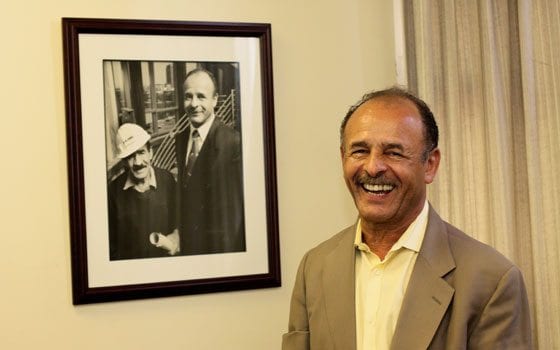

The John B. Cruz Construction Co. started 60 years ago and is now one of the New England region’s largest minority-owned construction and development companies
As life-changing decisions go, this one seemed to be an easy one. Flush with cash earned during three summers of construction work — and the keys to his own Mercury — then high school senior John Cruz III looked at the numbers.
John D. O’Bryant, Cruz’ guidance counselor at Boston Technical High school, had checked into the average annual salaries at the time of some of Cruz’ choices for his future. Cruz was nearly crest-fallen. His dream of becoming an actor or a big-time writer faded fairly quickly.
“I’ll never forget that,” Cruz says. What O’Bryant did suggest was that Cruz work for his father and “try to grow the business.”
And Cruz has done just that. Over the last 40 years he managed to transform his father’s small carpentry business into one of the New England region’s largest minority-owned general contracting and development companies. Its management wing alone handles about 1,500 units of affordable housing throughout the city.
Best known for his role in the development of the skyscraper formerly known as One Lincoln in downtown Boston, the Reggie Lewis Track and Athletic Center and the new Boston police station, Cruz has succeeded beyond his father’s imagination — and has become a community institution.
Cruz said he didn’t always have his father’s full-fledged support. “My father was quite content with his carpentry business,” Cruz said. “But I wanted to go into development. And he never really did. For him, it was always too expensive and too much of a hassle. But I would still try to get him to go along by starting the conversation with ‘I know it’s your money, but … ’ ”
It’s been a tough battle. The construction industry has always been messy, especially in Boston during the 1970s when Cruz started work full-time after attending the Wentworth Institute.
With little opportunities in the private construction market, minority developers relied on public projects — and government set-asides — to get a start and, all too often, maintain a fair share in construction dollars. But as construction work dried up in the private market, more and more white-owned companies were forced to bid on government projects, leaving under-capitalized minority firms unable to compete.
More often than not, government contracting became subject to state and federal legal challenges — and court rulings that limited race-based contracting policies.
In fact, opposition was so fierce here in Boston that then City Councilor President James Kelly, a staunch critic of minority set-aside programs, once said, “I don’t think a contract should be awarded to a minority contractor unless there is proof that that contractor is a victim of discrimination. No one is trying to help a small white-owned firm.”
Like many others, Cruz strongly disagreed and argued that those programs were needed to reverse decades of discrimination within the construction industry. “If it weren’t for some of these minority-preference programs,” Cruz once explained, “a lot of minorities wouldn’t be in business.”
Known for his long-standing tradition of hiring minorities, Cruz said that part of his success has been his ability to bring construction jobs to communities of color.
“I think that we bring a strong sense of helping the community because it is our community,” Cruz said.
Part of the problem for minority-owned businesses was acquiring bonding, a type of insurance that guarantees work will be completed if a contractor goes belly up, usually about 10 percent of the project’s total value. A $1.5 million project, for instance, would require a minimum of $150,000, making most of the jobs too costly for small businesses.
A requirement for bidding on most construction projects, bonding was at the heart of a vicious cycle: Without a record of completing big jobs, minority contractors couldn’t get the insurance, and without insurance they were unable to bid on jobs.
“I’ve been doing general contracting since 1970, and I still have a major problem with bonding,” Cruz said. “Racism is still out there, but it shouldn’t be an excuse not to succeed. It just means you have to work a lot harder.”
There have been many successes. One was the Demonstration Disposition Program, a $187 million state-run, federally funded initiative to renovate 1,650 apartments in Boston’s minority neighborhoods.
Started in the early 1990s, the program saw then Gov. William Weld break from his conservative colleagues over affirmative action and award more than 80 percent of the work to minority contractors.
As president of the Contractors Association of Boston, a minority contractors group, and a board member of the Minority Developers Association, Cruz played an active role at the time in organizing community support to insure minority participation — and benefits.
More recently, Cruz Construction Co. is the builder of Harvard Commons, a suburban-styled development located in the former Boston State Hospital site on the Dorchester/Mattapan border.
With the housing market in a slump, Cruz says he is staying the course — as his father did some 60 years ago. “We’re like everybody else, struggling and treading water,” Cruz said at the beginning of the Great Recession. “But we’ve made it through other recessions and we’ll make it through this one.”
After some forty-odd years of working in the family business, Cruz can only marvel at what his father created.
His father, John “Bertie” Cruz Jr. died in September 2008.
“I learned the joys of a work ethic at a very early age,” Cruz said with a laugh. “What we need is the work ethic back in our community. There was no affirmative action in 1947. There were no equal opportunities for minorities or women. My father had to face some huge challenges. But out of adversity comes opportunity.”


![Banner [Virtual] Art Gallery](https://baystatebanner.com/wp-content/uploads/2024/04/Cagen-Luse_Men-at-store-e1713991226112-150x150.jpg)



